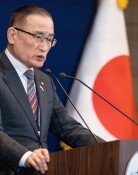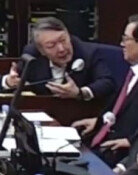[Opinion] Special Prosecution Needs to Become Permanent
[Opinion] Special Prosecution Needs to Become Permanent
Posted January. 15, 2002 09:47,
There is no more regular public prosecution in Korea now. The Prosecutor General, who resigned from a guaranteed two year term and has withstood the assaults of the opposition party, stepped down dishonorably, while public officials and prosecutors involved in the various gates are lined up to resign or receive prison sentences.
Public trust who hoped that these officials would find the truth and establish justice has sunken and crashed. Not a thread of hope or expectation remains now for them. For some time now, the public has expressed that they will not last with their existing framework and attitudes. The people even warned that they would not survive long without changing.
Our public prosecutors responded with well-oiled words to such warnings, promised change, and acted like things would turn for the better any minute. Yet, they ultimately did not have the ability to ward off the public`s suspicion and mistrust nor the power to change. They were dealt a deathblow.
What meaning now does the prefix `Special` carry and what can it possibly promise to change? After the Special Prosecution came on the scene, we who have been accustomed to the sight of regular public prosecutors have witnessed a change, even though the truth still remains to emerge from the court.
The Special Prosecution Investigation Team discovered that the younger brother of the Prosecutor General was really connected with Lee Yong-Ho and disclosed the fact that this younger brother used his family connection to lobby on Lee Yong-Ho`s behalf. As a result, the team secured his arrest warrant from the court.
The Public Prosecution focused its investigation on the leadership of the Supreme Public Prosecutors Office yet pressed no charges after the investigation nor located involved individuals. Now the new Special Prosecution team shows up and finds new facts and evidence of criminal activity – this is certainly a noteworthy contrast.
The difference between the regular prosecution and the Special Prosecution is not simply one of ability and will. The only real difference is the fact that the Special Prosecution does not answer to anyone and is under no external influence regarding promotion and job security.
It is precisely this point that makes it impossible for the Public Prosecution to take charge of special cases which do not even comprise 1 percent of the total case load. They are beset by the rank hierarchy where the superior`s command creates pressure and a single utterance from political authorities stir up worries over promotions and job security instead of promoting efficient work based on the law, conscience, and responsibility.
Unfortunately, then, the only option left is to establish the Special Prosecution as a permanent institution.
Although past two experiences with the Special Prosecution did not result in complete success, there is no basis to oppose this in light of the current Public Prosecution. The Public Prosecution, which has sole authority to conduct national investigations and prosecute, has failed to maintain its political neutrality, have pushed the people to the limit of mistrust by failing to conduct rigorous and thorough investigations into the corruption of high-ranking public officials, and led the public to begin distrusting even the nation`s governmental system itself.
Of course, the Special Prosecution would face the challenge of taking up cases regarding governmental official corruption which make political neutrality difficult, the potential weakening of the government`s prosecuting power, and the limitations of conducting investigations. On the other hand, the Special Prosecution may alleviate the Public Prosecution`s burden in investigating political cases and strengthen the Public Prosecution`s political neutrality.
In order for a Public Prosecution that establishes law and order to be reborn, there will have to be a systematic mechanism in addition to the establishment of the Special Prosecution. First and foremost, the personnel relations that requires submission and obedience to superiors must be overhauled. In order to guarantee fairness, transparency, and objectivity in personnel organization, persons outside the office should participate in the prosecution personnel committee and the committee must become a decision-making body. The financial requisition system must be expanded in order to strengthen judicial power over the authority to prosecute. When the Prosecutor General is appointed, he must be reviewed through an appointment hearing in order that a person of conviction and democratic principles will be appointed. Only by these measures can public mistrust and doubts about the Public Prosecution wash away.
Now, the Public Prosecution must humbly listen and accept the people`s demand for reform and criticism with an open posture.
The Public Prosecution will have to change itself and become a governmental body worthy of public confidence if it is to become not the object but the leader in eradication corruption, which the President emphasized at the New Year`s Press Conference.
Ha Tae-Hoon (Koryo University, Professor of Law)






![[사설]참 구차한 김병기 전 원내대표](https://dimg.donga.com/c/138/175/90/1/wps/NEWS/IMAGE/2026/01/13/133151454.1.jpg)
